This is our rundown of the top Wi-Fi boosters for Verizon Fios Internet in 2024.

We bought a few Wi-Fi repeaters and extenders to test and evaluate, and we’d want to share our findings with you.
After careful and thorough testing, we can confidently say that the TP-Link RE650 is our top pick Wi-Fi extender for Verizon Fios. It’s simple to operate, quick, and doesn’t cost a fortune.
Best Overall – TP-Link RE650
Best Overall
- Coverage: ~70 feet
- Max speed (Wi-Fi): 332.58 Mbps
- Separate networks: Yes (not with TP-Link routers)
- Recommended for: Gigabit Connection Verizon Fios plan or lower
- Wireless standard: Wi-Fi 5 AC2600
- Warranty: 3 years
However, your unique requirements and circumstances determine the best extender for your home. Nobody lives in the same house, has the same router, or utilizes the same internet package, so which extender is best for you depends on that.
We’ve put together a list of the best five Verizon Fios extenders to help you choose the right one for your needs.
To learn all about the top five Wi-Fi booster solutions, read on.
Top 5 Wi-Fi Extenders For Verizon Fios
- TP-Link RE650 AC2600 – Best Overall
- Netgear X6S EX8000 AC3000 – Best for Many Devices
- Netgear EAX80 AX6000– Best Performer
- Netgear EX7300 AC2200 – Best Value
- TP-Link RE315 AC1200 – Budget Friendly
5 Best Wi-Fi Extenders For Verizon Fios
Here are our brief reviews of the best Wi-Fi boosters for Verizon Fios internet.
#1 TP-Link RE650 AC2600 – Best Overall
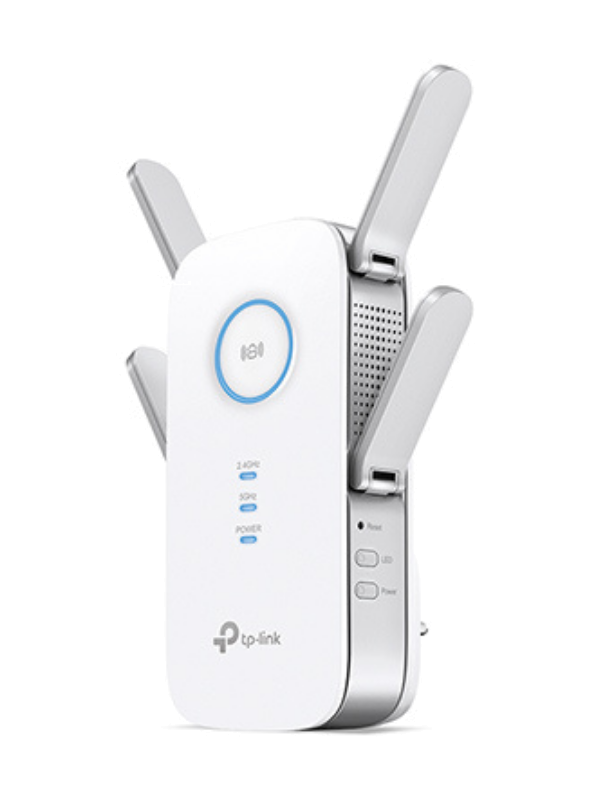
- Coverage: ~70 feet
- Max speed (Wi-Fi): 332.58 Mbps
- Separate networks: Yes (not with TP-Link routers)
- Recommended for: Gigabit Connection Verizon Fios plan or lower
- Wireless standard: Wi-Fi 5 AC2600
- Warranty: 3 years
Pros
- Fast speed
- 3-year warranty
- Best range of all
Cons
- Creates a second network (without OneMesh)
For the Wi-Fi extender for Verizon Fios with the greatest range, we suggest the TP-Link RE650 AC2600.
The TP-Link RE650 (802.11ac) is the longest-reaching Wi-Fi booster we’ve ever tested, with a Wi-Fi signal reach of 70 feet on Wi-Fi and 80 feet on Ethernet.
It provides fantastic coverage to reach all of your rooms, even in large homes. In most cases, you can even extend Wi-Fi outside your backyard.
On the 5 GHz band, the RE650 delivers excellent speeds of up to 332.58 Mbps on Wi-Fi and 657.23 Mbps on Ethernet at five feet.
If you want to hardwire devices like gaming consoles or smart TVs, the TP-Link RE650 also has a gigabit Ethernet connection built-in.
It also works with all major Wi-Fi routers, including the one from Verizon Fios.
With its quick speed, you may download an encyclopedia while simultaneously streaming many 4k videos while on a video conference without trouble.
The Tether app from TP-Link made it simple to get the RE650 up and running. It just took a few minutes to finish.
One disadvantage is that the RE650 generates a second network, which might be challenging to manage with wireless gadgets as you go from room to room. This is because you have to change the network manually as you move around.
However, you will only have one network if you have a TP-Link router with OneMesh or connect it to the router with Ethernet.
The TP-Link RE650 AC2600 is an excellent Wi-Fi extender for Verizon Fios customers seeking the maximum coverage possible. The only drawback is that if you don’t have OneMesh, it will establish a secondary network.
#2 Netgear X6S EX8000 – Best for Many Devices
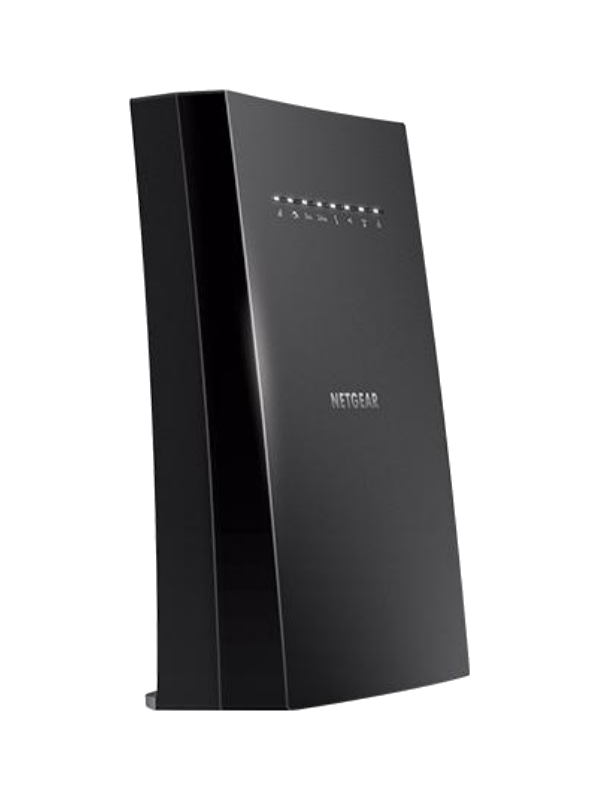
- Coverage: 50 feet
- Max speed (Wi-Fi): 318.21 Mbps
- Separate networks: No
- Recommended for: Gigabit Connection Verizon Fios plan or lower
- Wireless standard: Wi-Fi 5
- Warranty: 1-year
Pros
- Good range
- Fast speed
- Can handle many devices
Cons
- Some setup delays
If you have a lot of smart devices (~25 or more) and are on a Gigabit Connection plan or lower, the Netgear X6S EX8000 AC3000 is our top pick.
The 5 GHz band offered speeds of:
- 318.21 Mbps at 5 feet
- 184.51 Mbps at 15 feet
- 158.51 Mbps from 25 feet
Its speed nearly doubled to 628.21 Mbps after connecting it to the router with Ethernet (at 5 feet).
Although not the quickest extender we evaluated, it offers enough speed to download almost 100 GB in just over 3/4 of an hour on Wi-Fi. It also provides a good mix of performance, range, and price.
Our ASUS RT-AX88U router was configured using the ASUS WRT software for all the extender tests. So, if you are utilizing a less powerful/old router, your speed and performance may differ.
The X6S range was more than sufficient, but it wasn’t exceptional. The maximum reach we got was 50 feet. But if you position this extender detector in a central location, it should be enough to cover most multi-story houses.
The Netgear X6S EX8000 AC3000 was a little tough to set up, but it generally performs well. It just took a few tries to link it to the router. However, everything functioned smoothly from that point on.
In addition, the Netgear X6S is a Tri-band extender with an additional 5 GHz band. This increases bandwidth and is the reason we recommend it for you with many smart devices.
Setting up the Netgear X6S was a bit difficult, but it is a decent extender with good range and speed performance. It also has combined networks, which operate better with laptops, smartphones, tablets, etc., since you don’t have to change networks when moving throughout your home.
The X6S’s combination of speed, range, and fair price make it one of our top picks for Verizon Fios.
#3 Netgear EAX80 AX6000 – Best Performer
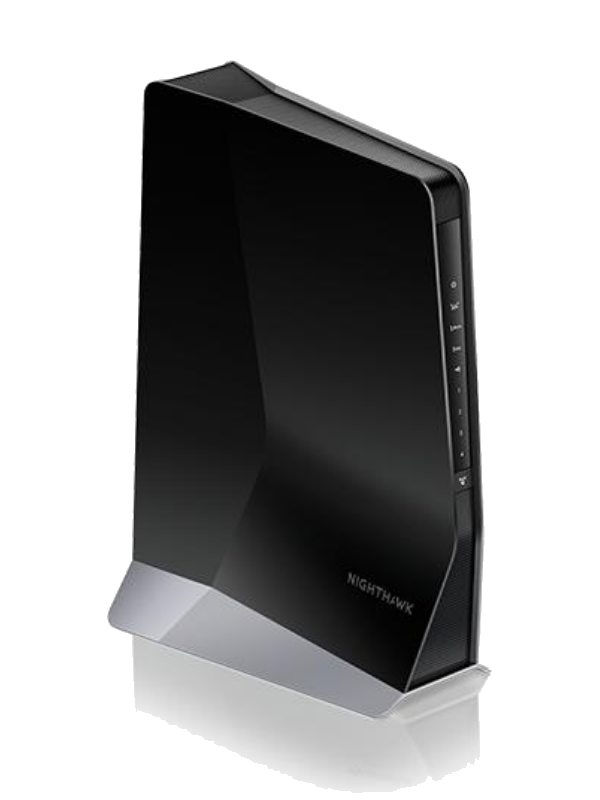
- Coverage: ≈ 65 feet
- Max speed (Wi-Fi): 437.34 Mbps
- Separate networks: No
- Recommended for: Gigabit Connection Verizon Fios plan or lower
- Wireless standard: Wi-Fi 6 AX6000
- Warranty: 1-year
Pros
- Fantastic range
- Single network
- Fastest we have tested
Cons
- Some problems setting up
- More expensive than other options
For the best-performing Wi-Fi extender for Verizon Fios, we recommend the Netgear EAX80 because it is super fast and can extend your Wi-Fi signal by 65 feet.
That should be more than enough range to cover any Wi-Fi dead zones in most houses, even big ones.
The TP-Link RE200X Wi-Fi range extender can deliver speeds up to 436.34 Mbps on Wi-Fi and 811.59 Mbps on Ethernet at five feet utilizing the 5 GHz band.
This is the fastest result we got from the Wi-Fi extenders we tested and is fast enough to download a WHOLE 100 GB file in just over forty minutes!
The Netgear EAX80 is compatible with the newest 802.11ax Wi-Fi standard (Wi-Fi 6), meaning it uses the latest technology, is faster, and has more bandwidth. Plus, it works with all leading Wi-Fi routers for Verizon Fios.
The EAX80 offers one of the most significant benefits of all models: it doesn’t create a second network. You can roam around your house without having to worry about the network you’re using on wireless devices. No matter what router you have.
The EAX80 was more challenging to set up than the other models we tested, and it took us longer to get everything up and running. We also had to completely reset the EAX80 to work after switching from Wi-Fi to Ethernet.
It’s also pricier than the other four units we suggest in this guide.
Despite its flaws, the Netgear EAX80 AX6000 is a fantastic choice for a Wi-Fi extender with a great range and the best performance possible.
#4 Netgear EX7300 AC2200 – Best Value
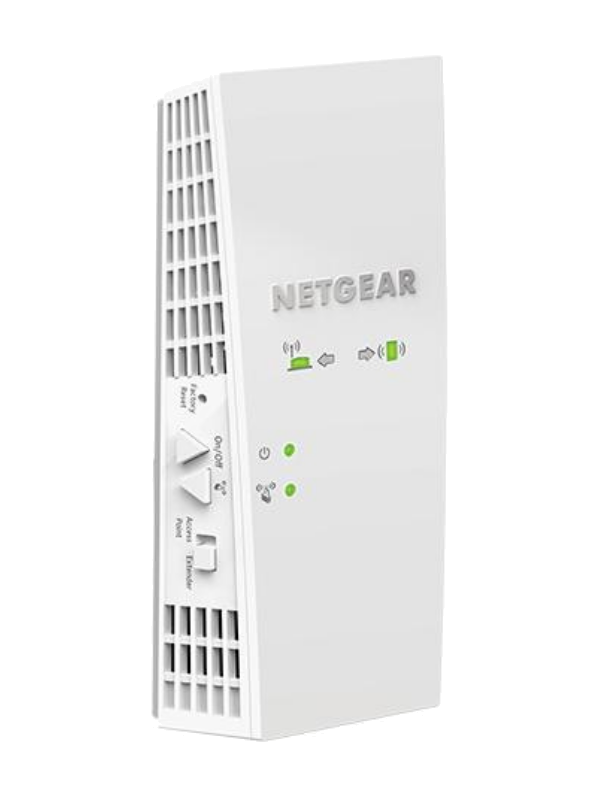
- Coverage: 60 feet
- Max speed (Wi-Fi): 324.58 Mbps
- Separate networks: Yes
- Recommended for: 500 Mbps Verizon Fios plan or lower
- Wireless standard: Wi-Fi 5
- Warranty: 1-year
Pros
- Quick setup
- Low-cost
- Good range
Cons
- Setup hiccups
If you use Verizon Fios Internet and want the greatest value, we suggest the Netgear EX7300 AC2200.
At a distance of 5 feet, the Netgear EX7300 extender reached speeds of 342.58 Mbps on Wi-Fi and 651.58 Mbps on Ethernet on the 5 GHz band in our tests.
The EX7300 is not as fast as the EAX80 AX6000, which is our previous pick. Although it’s slower, it’s still quick enough for each family member to watch separate 4k movies simultaneously and use their smartphones online.
This Wi-Fi repeater is compatible with all major Wi-Fi routers and offers a gigabit Ethernet connection. This allows you to connect devices directly to your network without connecting directly to your router.
It was also simple to set up. It took us only a few minutes, but we did have one problem while doing so: it wouldn’t connect right away.
However, we did a complete reset, and it worked properly. It could have just been a fluke.
Plus the EX7300 does not make a second network. So you never have to worry about switching networks with your wireless devices when you walk around your home.
It’s one of the most affordable options on our list, and it costs less than many of the other picks (save for the TP-Link RE315 AC1200). It also offers exceptional performance and coverage.
#5 TP-Link RE315 AC1200 – Budget-Friendly
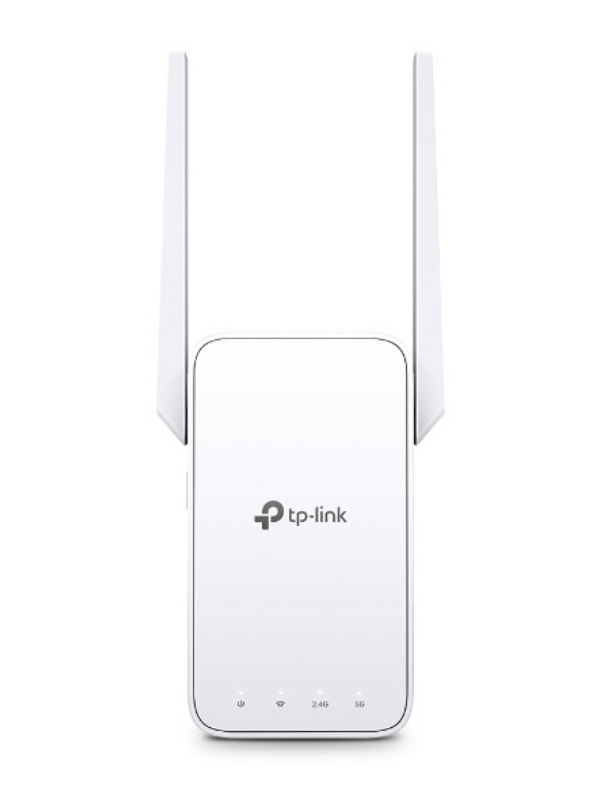
- Coverage: 60 feet
- Max speed (Wi-Fi): 187.61 Mbps
- Separate networks: Yes (unless you use OneMesh)
- Recommended for: 300 Mbps Verizon Fios plan
- Wireless standard: Wi-Fi 5
- Warranty: 3 years
Pros
- Easy setup
- Decent range
- Fast enough for Verizon’s entry plans
Cons
- Creates a second network
- Not as fast as other extenders
Our budget-friendly pick is the TP-Link RE315 AC1200. It works well with the Verizon Fios 300 Mbps plan and provides decent speed and range.
The RE315 boosted our Wi-Fi signal up to 60 feet on WiFi and 70 feet on Ethernet. This is enough to extend Wi-Fi coverage throughout one of the floors of your home.
On the 5 GHz band, it delivered speeds of up to 187.61 Mbps at 5 feet away and 165.21 Mbps at 15 feet when connected via Wi-Fi.
When we connected the extender directly to our router with an Ethernet cable, the speed increased to 302.51 Mbps.
This is more than adequate speed for households on the 300 Mbps Verizon Fios plan.
With a TP-Link router and OneMesh or using an Ethernet connection, you can combine two networks into one rather than two. Otherwise, it makes a new, second network.
In that case, you will have to switch back and forth between networks as you travel throughout your house with wireless devices.
The TP-Link RE315 AC1200 is also super easy to set up. We were able to do it in a matter of minutes using the TP-Link Tether mobile app.
Overall, the TP-Link RE315 AC1200 is a fantastic budget-friendly option for Verizon Fios customers who have basic internet service or want to save money.
It’s one of the most affordable Wi-Fi extenders on the market yet provides decent speeds and range. The main disadvantage is making a second network if you don’t utilize OneMesh or Ethernet.
Do you need a Wi-Fi Extender?
If your Wi-Fi router covers most of your house and you only want to extend the coverage to a particular room or section, a Wi-Fi extender may be the perfect solution.
However, before purchasing a Wi-Fi extender, you should test a few methods to widen your coverage.
If feasible, consider moving your router to a central location in your home.
If you’re unhappy with the performance of your Verizon router, consider buying your own. Or, if your router is more than five years old, a new one may also help you cure your Wi-Fi dead zone problem too.
Check out our article on the best routers for Verizon Fios here if you want to get a new one.
Verizon Fios Wi-Fi Extender Buying Guide
Here is what everyone should consider before buying a Wi-Fi extender/repeater for Verizon Fios Internet. For more info, check out our extender buying guide.
Match the Brand
If you don’t have the Verizon Fios router included with your internet plan, we recommend buying a Wi-Fi extender from the same manufacturer.
We recommend matching the brand as many routers and extenders from the same manufacturer may be linked together to build a single network (for example, TP-Link with OneMesh). This makes installation much more manageable.
This is also the case if you have Verizon Fios’s standard router (Fios branded). Because Verizon has its own Wi-Fi extender.
I don’t have any experience with it, but after checking its specs, it seems to be pretty good. Even though it’s only Wi-Fi 5, which is slightly older and slower Wi-Fi standard.
It should be enough for you to take advantage of any Verizon plan.
Just note that it’s only compatible with Fios Advanced Wi-Fi Router (MI424WR) and Fios Quantum Gateway Router (G1100).
However, you will only get seamless roaming (when the extender and the router combine their networks) if you have the G1100.
Otherwise, you will have to change the network manually when moving around.
Wi-Fi 5 vs. Wi-Fi 6
Wi-Fi 5 and Wi-Fi 6 are the two most widely used Wi-Fi standards today.
Wi-Fi 6 is more reliable, performs faster, and supports more devices. On the other side, Wi-Fi 5 is less expensive and often enough.
If you want the most cutting-edge technology, go with a Wi-Fi 6 extender. However, it will only operate to its full potential if your router is also Wi-Fi 6 compatible. But, you will future-proof your home network since you’ll likely upgrade your router eventually anyway.
So even if your router is Wi-Fi 5, we still recommend a Wi-Fi 6 extender.
A Wi-Fi 5 repeater, on the other hand, might be enough for many users because they are less expensive and good enough for their home network.
Read our guide on Wi-Fi 5 vs. Wi-Fi 6 for more details.
What if my Router is Wi-Fi 4?
If you have a Wi-Fi 4 router, rather than purchasing an extender, we recommend purchasing a new router.
If you upgrade from a Wi-Fi 4 router, most of your Wi-Fi dead zones will likely be eliminated.
The determine if your router is Wi-Fi 4, check its label. The label is usually on the back or bottom and look for 802.11n. Alternatively, you can check its documentation (if you still have it) or online for more info.
Read our top 7 selections for Verizon Fios routers for some fantastic options.
Dual-band vs. Tri-band
If you have the Verizon Fios (1000 Mbps or higher) plan and many smart home devices, we recommend purchasing a tri-band repeater to get the most out of their top-tier plan.
A dual-band extender has two separate wireless networks: a 2.4 GHz network and a 5 GHz network. In addition to the other 2.4 and 5 GHz bands, a tri-band extender also has a second 5 GHz network.
A tri-band extender doesn’t improve your internet speed, but it does add extra bandwidth. The additional 5 GHz band improves 4K video streaming, online gaming, video meetings, etc.
You can also use a dual-band router with a tri-band extender and vice-versa. So, it’s nothing to worry about.
Find out more about dual-band and tri-band routers and extenders here.
Coverage
Each Wi-Fi booster will generally display its range on its product page.
That being said, the majority of them are incorrect. Some over-promise, while others underestimate.
The extenders we tested typically covered between 70 and 120 percent of their stated range. To guarantee that your Verizon Fios Internet reaches your dead zones, we recommend a Wi-Fi extender with a 30 percent greater range than the distance you require.
You should note that the range of your extender depends on the quality of your router. A better and faster router can provide a stronger signal to the extender.
You should also be concerned about how near or far apart the extender is from the router. Both of these things result in lower speeds and coverage.
Connected to the Router Using Ethernet or Wi-Fi
Most Wi-Fi extenders can be linked to the router either wirelessly or through an Ethernet connection.
We prefer using an Ethernet connection because it provides a more secure and robust link between the two devices and faster speeds.
If you choose to connect through Wi-Fi, double-check that the connection between the router and extender is solid. A poor connection will result in decreased speeds and coverage for your devices.
Look at the “Signal Strength” indicator in your extender’s app to see how strong the link is. If it’s bad, try moving the extender closer to the router.
So, what mode is best?
In our tests, connecting an extender to the router with Ethernet offered approximately twice the speed and 20 percent more range than with a Wi-Fi connection.
Plus, by acting as an “access point,” the extender often doesn’t make a second network. Meaning it merges with your router network.
Ethernet connections always have a more stable connection than Wi-Fi, which is critical for web meetings, viewing 4k videos, or playing online video games.
So, in our opinion, using Ethernet whenever possible is the best option.
The only disadvantage of using Ethernet is that it isn’t as easy to use as Wi-Fi since you must run an Ethernet connection between the router and extender.
Mesh Wi-Fi vs. Wi-Fi Extender/Repeater
Wi-Fi extenders and mesh networks are two of the most common strategies to expand your Wi-Fi coverage and performance. While they both enhance network coverage and performance, they do so in distinct ways.
The most significant distinction is that a Wi-Fi Repeater simply repeats an existing signal. In contrast, a Mesh network uses numerous nodes to form a large Wi-Fi bubble with no single router.
If you have a Verizon Fios 500 Mbps plan or less and wish to extend your range less than 60 feet, a Wi-Fi repeater/extender is recommended.
If you have a Verizon Fios Gigabit Connection plan or better (940 Mbps) and want to extend your Wi-Fi beyond 60 feet, a Mesh System is the better option.
That said, these are just our guidelines, and are far from set in stone.
Read our article on Mesh Wi-Fi vs. Wi-Fi Repeaters to learn more.
How to Set Up an Extender With Verizon Fios
The best way to pair a Wi-Fi extender to your router is with the extender’s mobile app.
After you download the app, plug the extender in. Then connect to its Wi-Fi using your smartphone, and open the app. Next, follow the step-by-step instructions.
The average time for this procedure is less than two minutes.
You may also use the WPS button on the extender to connect them. You would need to hit both your router’s and the extender’s WPS button.
The WPS button on the Verizon Fios router is on the front, underneath the Verizon logo (red checkmark).
If you want to connect the devices via an Ethernet connection, you’ll need to set up the extenders on a computer.
When you start any browser on a computer, you will automatically go to the extender’s setup page.
For more info, check out our article on how to set up a Wi-Fi booster.
Verizon Fios Internet Plans
Here are the internet plans from Verizon Fios and the Wi-Fi Booster we recommend for each plan. [1]
| Internet Plan | Wi-Fi Booster |
| 300 Mbps Plan | TP-Link RE315 AC1200 |
| 500 Mbps Plan | Netgear EX7300 AC2200 |
| Gigabit Connection Plan (940 Mbps) | Netgear X6S EX8000 AC3000 |
FAQs
Here are a few of the most frequent questions we receive about Verizon Fios Internet with Wi-Fi boosters.
Which is the best Wi-Fi Extender for Verizon Fios?
The best Wi-Fi extender for your Verizon Fios network is the one that best matches your internet package, home, and budget.
If you have Verizon Fios’s 300 Mbps plan, the TP-Link RE315 AC1200 may be a better choice since you won’t need an ultra-fast one.
However, the TP-Link RE650 is our top pick.
It’s not prohibitively expensive, and it provides solid speed and coverage.
Where should I install the Wi-Fi extender?
The best place to install your Wi-Fi extender is halfway between your router and the Wi-Fi dead spot.
Just keep in mind that extenders need to be within the range of your router’s Wi-Fi signal to extend it.
If you’re unsure where to put it, try moving it around until you find the sweet spot.
Do I Need a Wi-Fi Extender if I Have Verizon Fios?
If you have Verizon Fios, you may not need an extender. It’s one of the quickest internet plans and most often comes with a modern router with an enhanced range.
However, if you’re having trouble obtaining a good signal in some parts of your house, an extender could fix that.
Can I Use a Wi-Fi Extender With Any Router?
In general, you can use a Wi-Fi extender with any router. However, pairing an extender with the same brand as your router can improve performance and make setup easier.
If you’re unsure which extender to get for Verizon Fios, we recommend choosing from our recommendations above.
The Final Verdict
If you have Verizon Fios Internet and need to extend your Wi-Fi signal to dead spots in your home, you need a good Wi-Fi extender.
The TP-Link RE650 is a fantastic option for anybody looking to save money while getting high-end features at a reasonable price. However, it may not be the best option for everyone.
Here are some factors to consider while selecting the best option for you:
- The extender’s range
- How it connects to the router (Ethernet or Wi-Fi)
- Your home’s size
- The speed of your Verizon Fios Internet plan
- How much you’re willing to spend
After you’ve looked at all of these elements, you’ll be well on your way to determining the best Wi-Fi extender for your needs.
